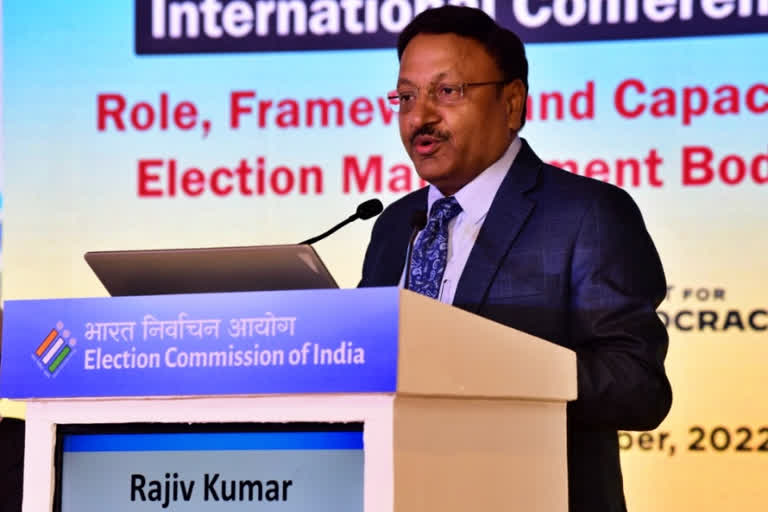New Delhi: Highlighting the idea of democracy in India, Chief Election Commissioner (CEC) Rajiv Kumar said that democracy has always been a part of Indian ethos, a way of life. Addressing a two-day international conference on ‘Role, Framework & Capacity of Election Management Bodies', the CEC said, "Diverse opinions, dialogue, discussions, accommodation and non-aggression have been an intrinsic part of our culture." He further stated that free, fair, inclusive, accessible and inducement-free elections being a cornerstone of a democratic polity, is a precondition to peace and development.
The Election Commission of India has been taking measures to include the elderly, transgenders, persons with disabilities and women in the electoral process, he said and pointed out, "Inclusivity also means adjusting inequalities, especially for women, persons with disabilities, senior citizens, young voters and marginalised population."
While stressing on the significance of the theme of the conference, he said that ‘Role, Framework and Capacity of Election Management Bodies’ are the core building block for ‘elections integrity’ as it covers both the foundational and the functional aspects of any electoral democracy. CEC Rajiv Kumar offered ECI’s expertise in election management to world democracies to take forward the Summit's commitments to real outcomes.
Speaking on the pressing challenges before the Election Management Bodies in today's context, the CEC stressed on the intersection of EMBs functioning with the social media platforms. He added that social media platforms do self-proclaim that they have content display policies but also have “algorithm power” in play.
“More early or deeper red flagging of fake news based on known modus operandi and genres is not an unfair expectation from the EMBs”, he underscored. Kumar added that such a proactive approach to counter fake news would facilitate credible electoral outcomes that will help preserve the ‘freedom’, that social media platforms require to thrive.
Also read: ECI allows citizens above 17 years to apply for Voter ID card in advance
Emphasising the significance of this conference, the poll panel chief noted that this "cohort is the right platform to learn from each other as we did during Covid." "Disenfranchisement, even temporarily, during turbulent times like the Covid pandemic is not an option for democracies", he added.
He emphasised that the cohort would lay the foundation for many more dialogues and institutionalised mechanisms to cooperate on contextual challenges and opportunities. Addressing the conference, Elizabeth Jones, Charge d’Affaires, United States, said "relationship with India is most consequential".
Praising the contribution of the poll panel in India, she said that the India-US partnership is getting stronger to address global challenges and to cooperate to bring peace, security and prosperity across the world. She also emphasised that the US and India have significantly contributed to building democratic institutions.
At the conference, nearly 50 participants from 11 EMBs from 11 countries participated--Aggeliki Barouta, Head of the Department of Elections and Political Parties, Ministry of Interior, Greece, Anthony Banbury, President & CEO, International Foundation for Electoral Systems, Kevin Casas- Zamora, Secretary General, International IDEA, representatives from UNDP & EMBs, including Armenia, Mauritius, Nepal, Cabo Verde, Australia, Chile, Federal States of Micronesia, Greece, Philippines, Excellencies and others--were present at the conference.



